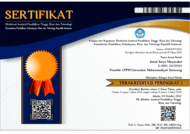Optimalisasi Inovasi Produk Makanan Berbahan Dasar Jamur sebagai Upaya Penguatan Wanita Tani Jamur melalui Pelatihan dan Pendampingan
(1) Program Studi Informatika, Universitas Muhammadiyah Semarang, Semarang
(2) Prodi Pendidikan Matematika, Universitas Muhammadiyah Semarang, Semarang
(3) Program Studi Pendidikan Matematika, Universitas Muhammadiyah Semarang, Indonesia
(4) Program Studi Pendidikan Matematika, Universitas Muhammadiyah Semarang, Indonesia
(5) Program Studi Informatika, Universitas Muhammadiyah Semarang
(6) Program Studi Manajemen, Universitas Muhammadiyah Semarang, Indonesia
(7) Program Studi Informatika, Universitas Muhammadiyah Semarang
(8) Program Studi Pendidikan Matematika, Universitas Muhammadiyah Semarang
(9) Program Studi Teknik Elektro, Universitas Muhammadiyah Semarang
(10) Program Studi Pendidikan Matematika, Universitas Muhammadiyah Semarang
(11) Program Studi Akuntansi, Universitas Muhammadiyah Semarang
(12) Program Studi Pendidikan Matematika, Universitas Muhammadiyah Semarang
(13) Program Studi Pendidikan Matematika, Universitas Muhammadiyah Semarang
(14) Program Studi Pendidikan Matematika, Universitas Muhammadiyah Semarang
(15) Program Studi Statistika, Universitas Muhammadiyah Semarang
(16) Program Studi Manajemen, Universitas Muhammadiyah Semarang
(17) (Scopus ID: 57204172803) - Department of Informatics, Faculty of Engineering, Universitas Muhammadiyah Semarang, Semarang
(*) Corresponding Author
Abstract
Genting Village, Semarang, has great potential for mushroom cultivation thanks to geographical and climatic conditions that favour healthy mushroom growth. Although farm women have been actively involved in mushroom cultivation in this village, they often face obstacles in terms of access to resources, knowledge, and marketing of mushroom-based processed food products. To overcome this problem, we, UKM Hizbul Wathan, in the PPK Ormawa 2023 grant activity, propose training and mentoring in the manufacture and marketing of mushroom-based food in Genting Village. The method we use is SWOT analysis, used to identify strengths, weaknesses, threats, and development strategies in overcoming the problems of the mushroom farmer women's group in Genting Village. Strengths include favourable geographical conditions for mushroom cultivation, participation of women farmers, and unique local wisdom. Meanwhile, the main weaknesses are limited access to resources and knowledge. Opportunities in diversification of mushroom-based food products and increasing consumer awareness about healthy food should be utilised. Threats include market competition and climate change. The discussion focuses on strategies for developing training programmes to improve farm women's knowledge and skills, effective marketing efforts, and partnership opportunities with external parties. The results of this study show that mentoring and training in mushroom-based food processing can create new economic opportunities, increase the income of farm women, and support sustainable development in Genting Village.
Keywords
Full Text:
PDFReferences
Afifah, S. N., & Ilyas. (2021). Pemberdayaan Kelompok Wanita Tani Asri. Journal of Nonformal Education and Community Empowerment, 5 (1)(1), 1–17. https://doi.org/10.15294/pls.v5i1.36404
Ardelia, R., Anwarudin, O., & Nazaruddin. (2020). Akses Teknologi Informasi melalui Media Elektronik pada Petani KRPL. Jurnal Triton, 11(1), 24–36. https://doi.org/10.47687/jt.v11i1.101
Budziewicz-Guźlecka, A., & Drożdż, W. (2022). Development and Implementation of the Smart Village Concept as a Challenge for the Modern Power Industry on the Example of Poland. Energies, 15(2), 603. https://doi.org/10.3390/en15020603
Lange, L., Agger, J. W., & Meyer, A. S. (2020). Fungal Biotechnology: Unlocking the Full Potential of Fungi for a More Sustainable World. In Grand Challenges in Biology and Biotechnology (hal. 3–32). https://doi.org/10.1007/978-3-030-29541-7_1
Mukhlisah, A. N. (2023). Penerapan Prinsip Participatory Learning And Action Untuk Memberdayakan Masyarakat Pada Kelompok Wanita Tani Melati Dikelurahan Kalebajeng Kecamatan Bajeng Kabupaten Gowa.
Noor, M. (2011). Pemberdayaan Masyarakat. Jurnal Ilmiah CIVIS, 1(2), 88. https://doi.org/10.2307/257670.Poerwanto.
Permatasari, P., Ilman, A. S., Tilt, C. A., Lestari, D., Islam, S., Tenrini, R. H., Rahman, A. B., Samosir, A. P., & Wardhana, I. W. (2021). The Village Fund Program in Indonesia: Measuring the Effectiveness and Alignment to Sustainable Development Goals. Sustainability, 13(21), 12294. https://doi.org/10.3390/su132112294
Sdiri, A., Pinho, J., & Ratanatamskul, C. (2018). Water resource management for sustainable development. Arabian Journal of Geosciences, 11(6). https://doi.org/10.1007/s12517-018-3411-z
Sukomardojo, T., Murthada, Iskandar, Ma’ruf, M. I., & Gymnastiar, I. A. (2023). Optimasi Praktik Pertanian di Komunitas Pedesaan Untuk Hasil Tanaman yang Berkelanjutan: Studi Keterlibatan Masyarakat. Jurnal Abdimas Peradaban, 4(2), 32–42. https://doi.org/10.54783/ap.v4i2.26
Susilowati, T., Nuswantoro, M. A., & Susiatin, E. (2022). Pemberdayaan Kelompok Wanita Tani dalam Upaya Menumbuhkan Minat Wirausaha. AMMA: Jurnal Pengabdian Masyarakat, 1(02), 36–42.
Vlados, C. (2019). On a correlative and evolutionary SWOT analysis. Journal of Strategy and Management, 12(3), 347–363. https://doi.org/10.1108/JSMA-02-2019-0026
Yustikasari, Y., Gemiharto, I., & Ayuningtyas, F. (2021). The Development of Communication Model for the Empowerment of Highly Poor Villages in Pangandaran Regency, West Java, Indonesia. IOP Conference Series: Earth and Environmental Science, 819(1), 012038. https://doi.org/10.1088/1755-1315/819/1/012038
Article Metrics
Abstract view : 280 timesPDF - 88 times
DOI: https://doi.org/10.26714/jsm.6.2.2024.174-180
Refbacks
- There are currently no refbacks.
Copyright (c) 2024 Jurnal Surya Masyarakat

Jurnal Surya Masyarakat (JSM) is licensed under Creative Commons Attribution-NonCommercial-NoDerivatives 4.0
------------------------------------------------------------------------------------------------------------------------
Jurnal Surya Masyarakat (JSM)
p-ISSN: 2623-0364; e-ISSN: 2623-0569
Published by: Lembaga Penelitian dan Pengabdian Masyarakat (LPPM) Universitas Muhammadiyah Semarang



.jpg)







.jpg)